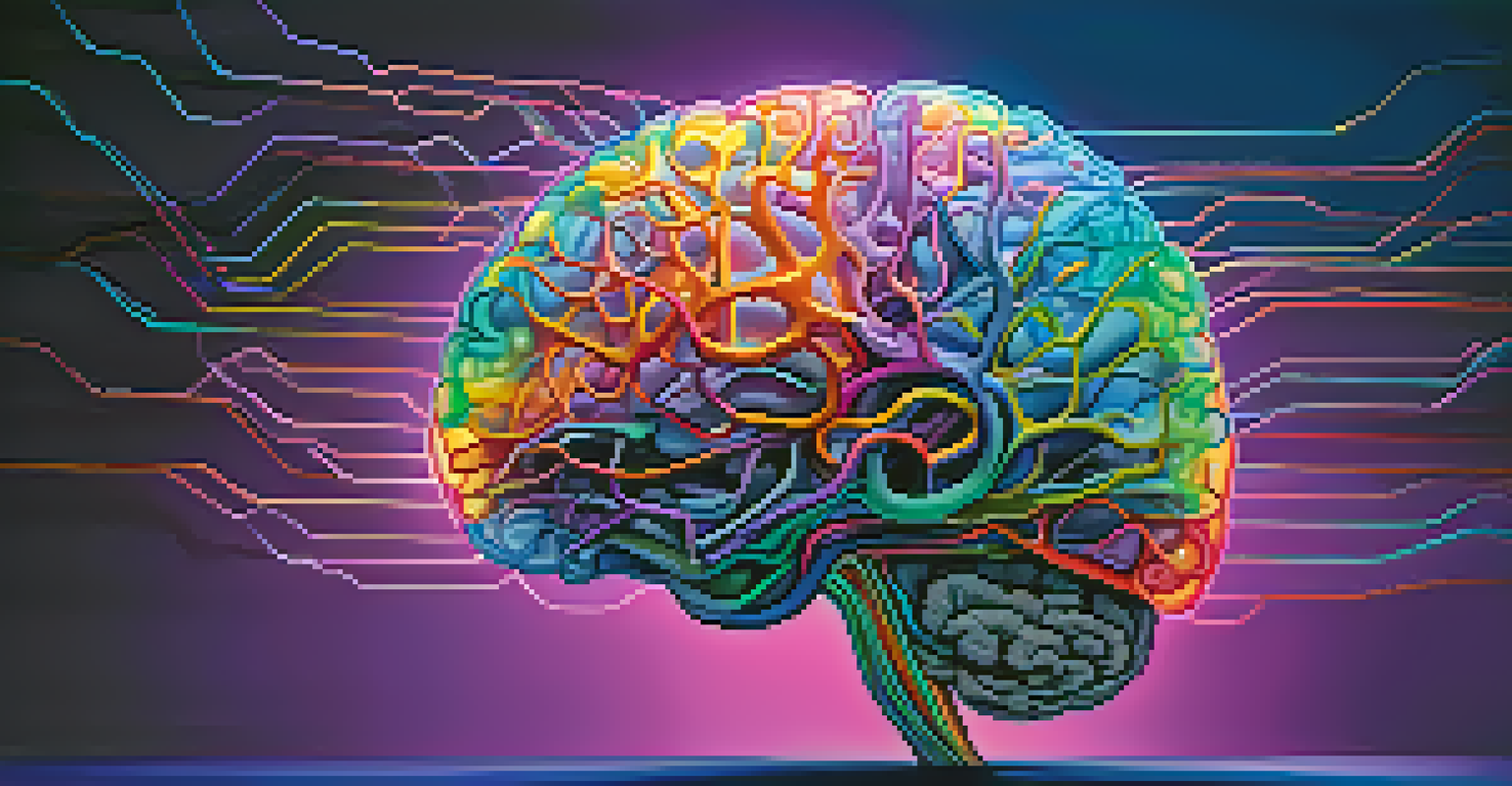Hallucinogens and Memory: Altered Recall and Perception

Understanding Hallucinogens and Their Effects
Hallucinogens are substances that can significantly alter perception, mood, and various cognitive processes. These include well-known drugs like LSD, psilocybin, and mescaline. Often associated with spiritual or therapeutic experiences, they can also lead to unexpected changes in memory and recall.
The mind is everything. What you think you become.
When consumed, hallucinogens interact with neurotransmitters in the brain, particularly serotonin. This interaction can lead to a distortion of reality, making users experience vivid visual and auditory hallucinations. As fascinating as these experiences can be, they often come with a price—especially when it comes to how memories are formed and recalled.
Understanding these effects not only sheds light on the complexities of human consciousness but also raises questions about the potential therapeutic uses of these substances. However, it's essential to balance curiosity with caution, as the impact on memory can vary widely among individuals.
How Hallucinogens Alter Memory Processing
Memory processing involves encoding, storing, and retrieving information, which can be significantly disrupted by hallucinogens. Users often report fragmented memories or an inability to recall events accurately while under the influence. This can lead to a unique experience where the lines between reality and hallucination blur.

For example, someone might vividly remember a conversation they had during a psychedelic experience, but the details may be completely distorted or entirely fictional. This alteration can create a sense of confusion and disorientation, affecting how memories are perceived even long after the effects have worn off.
Hallucinogens Impact Memory Recall
Hallucinogens can disrupt memory processing, leading to fragmented or distorted recollections of experiences.
Interestingly, some studies suggest that these altered states of consciousness can enhance certain types of creativity or problem-solving by allowing users to access unconventional thoughts. However, the reliability of these memories remains questionable, making it essential to approach the subject with care.
The Role of Context in Memory Recall
The context in which a hallucinogen is consumed plays a crucial role in shaping the memory experience. Factors such as setting, mood, and social interactions can influence how memories are formed and recalled. For instance, a serene environment may lead to more positive recollections compared to a chaotic one.
Reality is merely an illusion, albeit a very persistent one.
This phenomenon can be likened to a time when you might have a memorable dinner at a favorite restaurant—the ambiance, the company, and even the food all contribute to your overall experience. Similarly, the context of a hallucinogenic experience can enhance or distort memory recall.
Research indicates that memories formed in altered states may also be more susceptible to suggestion. This means that post-experience conversations and interpretations can shape how these memories are remembered, adding another layer of complexity to the relationship between hallucinogens and memory.
Anxiety and Memory: A Complicated Relationship
Anxiety can significantly impact memory recall, and this relationship can be further complicated by hallucinogens. Some users may experience heightened anxiety during their trips, which can lead to negative or distorted memories of the experience. This may create a cycle where anxiety affects memory, and skewed memories amplify anxiety.
For example, if someone feels anxious during a hallucinogenic experience, they might later recall it as overwhelmingly negative, regardless of the positive aspects they may have also experienced. This can create a skewed perception of their relationship with the substance and its effects.
Context Shapes Memory Experiences
The setting and mood during hallucinogenic use significantly influence how memories are formed and recalled.
Understanding this interplay between anxiety and memory is crucial, especially for those considering therapeutic use of hallucinogens. It highlights the importance of a safe and supportive environment to mitigate anxiety and enhance positive memory formation.
Potential Therapeutic Uses of Hallucinogens
Despite the potential for distorted memories, there is growing interest in the therapeutic applications of hallucinogens, particularly in treating mental health conditions. Research has shown that substances like psilocybin can help alleviate symptoms of depression and anxiety, often leading to transformative experiences.
These therapeutic sessions often occur in controlled environments, allowing for a more positive context that can help shape beneficial memories. The goal is to create a safe space where individuals can process their emotions and experiences effectively, leading to lasting change.
As studies continue to unfold, they reveal that the way memories are formed and recalled during these experiences can play a critical role in the healing process. This emerging field is exciting, but it also emphasizes the need for careful consideration and regulation.
The Science Behind Memory Alteration
The brain’s chemistry undergoes significant changes when hallucinogens are consumed, which can lead to alterations in memory. Neurotransmitters like serotonin play a crucial role in how memories are formed and recalled. When hallucinogens affect these pathways, the impact on memory can be profound.
For instance, studies show that hallucinogens can enhance synaptic plasticity—the brain's ability to adapt and change. This means that under the influence, new connections can be formed more easily, potentially allowing for unique insights and creative thoughts. However, this also raises questions about the authenticity of these memories.
Therapeutic Potential of Hallucinogens
Research suggests hallucinogens may offer therapeutic benefits for mental health conditions when used in controlled environments.
By examining the science behind these experiences, we can better understand the potential benefits and risks associated with using hallucinogens for memory enhancement or therapeutic purposes. It’s a complex interplay that deserves further exploration.
Navigating the Risks of Hallucinogenic Use
While the allure of hallucinogens may be strong, it’s essential to recognize the risks involved, particularly regarding memory and perception. Poorly managed experiences can lead to lasting negative memories or psychological distress. Furthermore, not everyone reacts the same way to these substances, which can complicate their safe use.
Consider the story of someone who had a challenging trip; the memories they formed during that time could haunt them, affecting their relationship with hallucinogens and even impacting their mental health. This underscores the importance of a supportive setting and mindset when exploring these substances.

As we continue to learn more about hallucinogens, understanding both their potential benefits and risks will be crucial. Responsible use, informed by research, can help individuals navigate this complex landscape successfully.